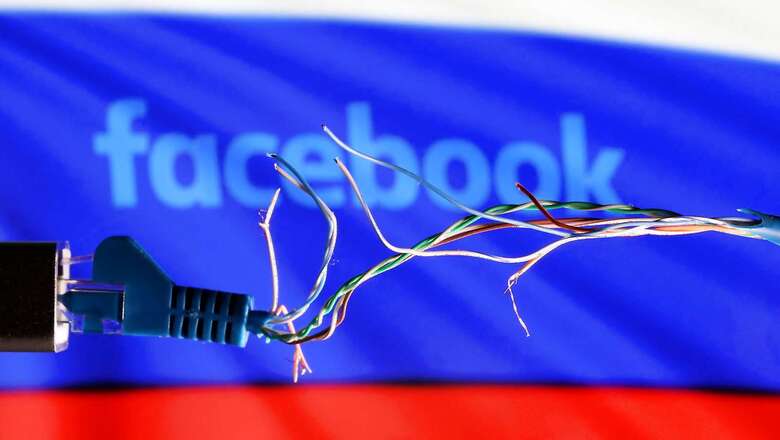
views
Russian prosecutors have sought a court to designate Meta Platforms Inc’s Facebook and Instagram as “extremist” following Moscow’s blocking of Facebook and limiting Twitter in a conflict with American social media platforms that has spiralled since its invasion of Ukraine.
The crackdown on social media escalated after the Russian government restricted Facebook access last week under new media law. However, if a judge approves the “extremist” categorization, it will effectively criminalise all of Meta’s operations in Russia. Furthermore, the company’s Instagram app would be disabled.
This comes at a time when tensions between the United States and Russia escalated after Russian President Vladimir Putin declared war against Ukraine, calling it a “special military operation”.
Meta Platforms, the parent company that owns Facebook, said on March 11 that it needed to make a temporary change in its content policy, only for Ukraine, to allow users to express their opposition to Russia’s attack. It happened after Russia filed a criminal complaint after the company said it would allow posts like “death to the Russian invaders”.
The Russian prosecutors urged the court to label American social media giant, while the Russian communications regulator announced that access to Meta’s Instagram would be restricted beginning March 14. This move is expected to affect around 80 million Russian people who have been using the social media platform.
It was Russia’s Investigative Committee, which announced that “a criminal case” has been initiated against Facebook. This committee directly reports to the Russian President.
Meta Global Affairs President Nick Clegg later tweeted a statement and said that the company’s goal was to protect free speech as a form of self-defence in response to the invasion of Ukraine and the policy only applied to Ukraine.
In the statement, Clegg said: “There has been a lot of coverage and discussion of how we are applying our policies to speech in the context of Putin’s invasion of Ukraine… the fact is, if we applied our standard content policies without any adjustments we would now be removing content from ordinary Ukrainians expressing their resistance and fury at the invading military forces, which would rightly be viewed as unacceptable.”
“We have no quarrel with the Russian people. There is no change at all in our policies on hate speech as far as the Russian people are concerned,” he added.
Censoring Social Media
In China, several web services are blocked, including Facebook, YouTube, Twitter and Snapchat. But its friendly neighbour Russia has been trying to follow China’s footsteps for more than a year.
Kremlin has been attempting to limit the impact of United States tech companies such as Google and Twitter, fining them repeatedly for allowing what it considers to be unlawful content.
After the return of Russian opposition leader Alexei Navalny to Russia from a hospital in Germany, where he had been treated for poisoning with the chemical weapon Novichok, efforts to regulate the distribution of unfavourable material on social media escalated even more in early 2021.
However, the invasion of Ukraine, which was met with a barrage of international censure and severe sanctions, has increased the possibility of putting more restrictions.
According to arguments made by the Russian prosecutor’s office, such actions by Meta’s management not only foster the notion that terrorist activity is permissible but also aim to incite hatred and enmity against Russian Federation citizens. Because of this, the Russian authorities urged the court to categorize Facebook and restrict its activities inside the country.
It is understood that among the popular social media platforms, YouTube and VK.com emerge as the top two options, followed by Meta’s Instagram, TikTok, OK.ru, Facebook and Twitter.
In the case of Facebook, Russia recently announced that it would ban the platform in the country in response to what it claimed were restrictions on access to Russian media on the platform.
However, WhatsApp, which also comes under Meta’s wide umbrella, is also widely used in Russia. But according to reports, it will be unaffected by the legal actions, because the messaging app is considered a means of communication rather than a way to post information.
Read all the Latest Tech News and Breaking News here




















Comments
0 comment